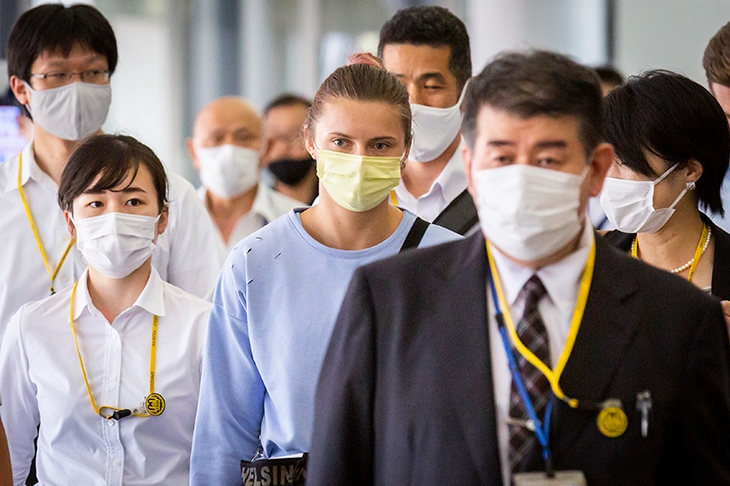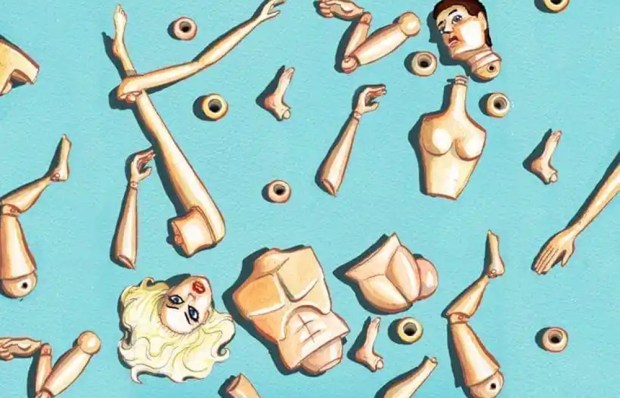An athlete seeking sanctuary in a foreign embassy after a state–sponsored attempt to spirit her home from the Olympics; a dissident found hanging from a tree in a foreign country that he’d been helping his compatriots escape to; a passenger jet diverted so one of its passengers could be arrested. The fate of critics of Alexander Lukashenko’s regime in Belarus might have been drawn from the depths of the Cold War. Like North Korea, Belarus has become a land that time forgot, still fighting battles we assumed had been lost decades ago.
There is, however, a big difference between now and the Cold War. The voice of the West is much fainter when condemning authoritarian regimes. Yes, Boris Johnson did meet the exiled Belarusian opposition leader, Sviatlana Tsikhanouskaya, in Downing Street last week and told her that the West was with her. A handful of senior Belarusian officials have had foreign assets frozen and the EU has imposed sanctions on potash exports from the country. But where is the great battle of ideas, the promotion of western democratic values throughout the world? Compared to the days when John Kennedy and Ronald Reagan made provocative speeches in front of the Berlin Wall, there is no longer a coherent voice being broadcast from the free world to condemn autocrats and to give hope to their people. Democracies appear to have lost confidence in democracy.
The world is a much freer place now than it was half a century ago. When it began, the Global State of Democracy Indices — compiled by the Institute for Democracy and Electoral Assistance since 1975 — counted 35 democracies and 90 non-democracies in the world; all other countries were registered as ‘hybrid’ regimes. Today, the count has essentially been reversed, with more than 90 democracies and 30 dictatorships. Yet most of the progress was made in the first half of the period since the Indices began — and the transition to democracy slowed markedly after 2000. Moreover, there are good reasons to fear that the trend will soon slip into reverse.
The dictatorship in Belarus grows more malignant by the week. It is a stark reminder that democracy can never be assumed as a natural state of government. The revolutions of 1989 fooled us into thinking that liberal democracy had proved itself to be so superior in feeding, clothing and nurturing populations that it would always win out: an argument famously advanced by Francis Fukuyama in The End of History and the Last Man in 1992. Few would make the same case today. Russia had a notional transformation to democracy before Vladimir Putin took over. He now sustains his position through fear. With such an influence on his doorstep, it is not hard to see why Lukashenkois inspired to behave the same way.
But it isn’t just in the former Soviet empire we need to fear the erosion of democracy. In the closing years of the last century, many former colonial countries in Africa still looked westwards for trade, investment and cultural influence. Soviet influence had vanished. Few people noticed that China was rapidly buying up the continent. According to the John Hopkins School of Advanced International Studies, Chinese direct investment in Africa increased from the equivalent of $75 million in 2003 to $2.7 billion in 2019 — overtaking US investment in 2012. China isn’t interested in promulgating democratic values in Africa, because it isn’t a democracy.
Three decades ago, it was easy to promote liberal democracy, because the most democratic countries tended to be the most economically successful. The Chinese model — capitalism combined with autocracy — has changed that. Indeed, it is possible to argue that China’s very lack of freedom has in some respects helped it to grow. With no pro-democracy protestors in the way, it is easier to develop land and energy projects, and to force surveillance technologies on the population. But it may not be possible for China to sustain its political and economic model: as people grow richer they will probably demand greater freedoms. Meanwhile, however, and especially since the advent of Covid, Chinese influence is surging.
The notion that the West has a moral duty to promote freedom and democracy around the world took a huge knock from the second Iraq war. Following George W. Bush’s failed attempt to create an instant democracy out of the smouldering ruins of Saddam Hussein’s dictatorship, the dominant western argument has been that not all parts of the world are suited to democracy, and it is not our business to intervene.
Liberal self-doubt should only go so far, though. Do we really think that Belarusians would not rather be rid of Lukashenko and his thugs? Can we not offer dissidents greater help and be less shy about promoting liberal democracy?
The unashamed advocacy of western values helped end the Cold War. There is every reason to hope that it could help reinvigorate the passage towards freedom around the world and topple malignant regimes in Belarus and elsewhere.
Got something to add? Join the discussion and comment below.
Get 10 issues for just $10
Subscribe to The Spectator Australia today for the next 10 magazine issues, plus full online access, for just $10.
You might disagree with half of it, but you’ll enjoy reading all of it. Try your first month for free, then just $2 a week for the remainder of your first year.














Comments
Don't miss out
Join the conversation with other Spectator Australia readers. Subscribe to leave a comment.
SUBSCRIBEAlready a subscriber? Log in